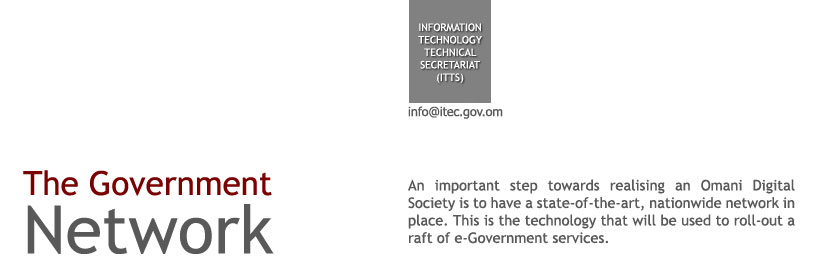Source: ITTS, www.itec.gov.om

In order to provide an optimal environment through which fast and secure e-Transactions can be achieved, government understands that its network must be efficient and secure and capable of supporting data, voice and video traffic over the same infrastructure. In this regard, the implementation and management of the government’s network has been outsourced to the Oman Telecommunication Company (Omantel), who has invested heavily in the expansion of a Multi-Protocol Label Switching-enabled (MPLS) IP network.
MPLS has emerged as a popular technology as it is applicable to a variety of traffic or protocols hence the “Multi-Protocol” name tag. In an MPLS-enabled network, the hardware assigns “labels” to each packet. These labels contain information about the packet, such as its origin, destination and priority. This information then helps the network transmit traffic, avoid congestion and inefficient paths, which enables the network to meet specific Service Level Agreements (SLAs). This “switching” of labels through the network is more efficient than traditional packet-routing techniques. MPLS can also be used to provide Virtual Private Networks (VPNs) which can isolate traffic from different Ministries across the network.
MPLS-based VPNs are flexible in that the addition of new sites to any Ministry VPN or reconfiguration can be achieved with minimal effort. Moreover, the use of an MPLS balances the traffic load on various links within the network and makes it possible to utilise the network’s bandwidth more efficiently.
By outsourcing the implementation and management of the network, government has ensured that services provided are reliable and efficient. In this regard, services must meet the SLAs agreed between government and Omantel. In brief, SLAs define parameters such as the availability and performance levels of the network and the response time to any incidents. In cases where the service is lower than the established SLAs, payment for the service will be lower. It is suggested that by agreeing lower payments for services that do not meet the SLAs will ensure prompt restoration of faults or deficiencies related to the network – this in turn will minimise impact on any e-Services provided by government. Moreover, taking on SLAs demonstrates Omantel’s commitment to providing services of the highest standard.
The government network is also a Managed Network Service where day-to-day activities are outsourced - this provides government with established technology and tools to monitor the network’s performance. Monitoring is used to track the uptime and performance of the network and determine whether agreed SLAs are being met. Outsourcing also offers government staff an opportunity to focus on other value added activities.
The implementation of the network makes Oman a regional leader in the deployment of technologically advanced telecommunication infrastructures. Indeed, it is a dynamic and sophisticated network that is helping transform Oman’s telecommunication infrastructure, one that is capable of supporting a Digital Society and a knowledge-based economy. In brief, by grouping MPLS technology on the IP network, agreeing SLAs, Network Management and VPNs and the availability of encryption, government has created a reliable, efficient, robust and secure network through which it can deliver its rapidly expanding portfolio of e-Services.








